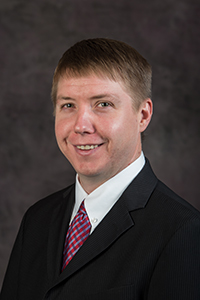October 14, 2016
Seay named to Financial Planning Association board of directors

Martin Seay, assistant professor of personal financial planning and certified financial planner, will officially join the Financial Planning Association's board of directors on Jan. 1, 2017.
Seay has been elected to a three-year term along with four other incoming members to round out the 14-member board. His obligations will include three annual meetings in February, June and November, in addition to the annual conference. Seay will remain active in his local Financial Planning Association chapter as an ambassador. The president of the board may also ask board members to serve on a number of committees in liaison, chair or advisor roles.
Members of the association's board of directors utilize their experience and diverse backgrounds to lead and govern the financial planning community based on core values and strategic thinking in order to advance its goals. These goals include advancing the recognition of the financial planning profession and serving as a home for certified financial planners.
As an educator, Seay is uniquely poised to further these goals among a select population: financial planning students.
Seay teaches a variety of courses in the School of Family Studies and Human Services' personal financial planning program, and he notes that a financial planner's job is to help clients meet their goals. It's all about people and applying psychology to financial planning. He's bringing this perspective with him to the board, which is compromised largely of practitioners.
"I think the Financial Planning Association is trying to better connect with students, place them in careers and close the gap between financial planning researchers and practitioners," said Seay in response to being the only educator currently on the board.
He said another goal of the association is to grow the profession and get qualified people to become financial planners.
"Through evidence-based practices, the Financial Planning Association has grown financial planning as a profession. Young graduates are able to learn in the classroom what others had to learn by trial and error before them," Seay said.
